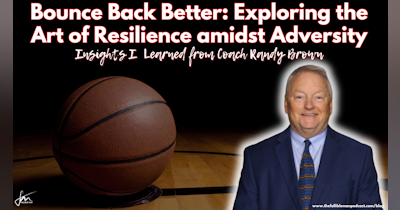In this conversation, you'll learn from Dave Robinson, a story work coach who transformed his life by turning his struggles into strength. Dave's life experiences, including a significant health scare and the subsequent reshaping of his career path, echo the challenges many of us face in our lives. He'll share how he used story work to process complex emotions and bring about positive change in his life. Dave's insights offer a fresh perspective on how to embrace personal growth and make empowered decisions, no matter what life throws your way.
Dave Robinson, a versatile professional with a background in education, strength and conditioning, and entrepreneurship, brings a wealth of experience to the table. His journey from teacher to fitness enthusiast to venturing into financial planning and entrepreneurship has equipped him with a deep understanding of personal growth and career transitions. Through his diverse career trajectory and bold decision-making, Dave offers a relatable and inspiring perspective on self-discovery and resilience. His story is a testament to the power of embracing change and seeking fulfillment in one's professional and personal pursuits.
In a world where we're constantly bombarded with information and expectations, it's easy to lose sight of ourselves. But to truly thrive, we need to invest time and energy in understanding our own emotions, decisions, and their implications. This is where self-reflection comes into play. It's not just a trendy buzzword, but a powerful tool to foster personal growth and empowerment. Engaging in self-reflection not only enhances our emotional well-being but also allows us to make more informed, confident decisions in every sphere of life. So, let's embark on this journey of self-discovery, shall we?
- What is the concept of story work and how can it be applied to navigate life's challenges?
- How can story work help in processing emotions and overcoming imposter syndrome?
- What is the impact of language on our emotional state and what role do positive affirmations play in this?
- How can transforming 'should' statements into 'could' and 'can' statements create a shift towards a more optimistic mindset?
- How can one use the power of words to navigate challenging situations like financial stress and job prospects effectively?
-
What is the concept of story work and how can it be applied to navigate life's challenges?
Story work is a tool aimed at instilling personal growth through self-reflection and empowerment. This concept echoes the understanding that personal narratives can dictate our perceptions of reality and shape how we navigate life's challenges. It's inherent in everyone's life as we all have some story to tell, be it of hardships, triumphs, or the mundane. The application of story work involves bringing awareness to these internal narratives, identifying patterns of self-talk, and consciously choosing to alter our language to drive positive change in our reactions and decisions. This transformative work involves a shift from reacting impulsively to responding thoughtfully, thereby instilling a sense of control and empowerment in one's life. 2: Dave Robinson's conviction in the power of story work is not only evident in his profession as a coach but also in how he has navigated his own life's challenges. One such experience was when Dave, faced with a health scare, had to reassess his priorities and aspirations. This defining moment led him to realize that he was settling for a mediocre life if he continued in his current career. Instead, he chose a different narrative and aligned his life with his passion for fitness and health by opening a health and wellness retreat in Mexico. This was one of many examples where using story work, he empowered himself to make changes and choices that aligned with his heart's desires. During challenging times such as the pandemic, when he had to close down his business in Mexico, Dave used story work to process emotions, find resolution, and make decisions that were best for him at that time. 3: Understanding the concept of story work and its application is crucial because of its potential to transform emotional states, create desired realities, and navigate life's challenges with confidence and resilience. Embracing this concept encourages us to explore the power of language, turn negative self-talk into empowering statements, generate optimism, and approach decision-making with a growth mindset. For example, by transforming should statements into could and can statements, we can shift from a place of resistance and pressure to a realm of possibility and empowerment. This enables individuals to move past limiting beliefs, transcend boundaries of their narratives, and take decisive actions. Therefore, story work can elevate the quality of one's life, leading to personal growth and fulfillment.
-
How can story work help in processing emotions and overcoming imposter syndrome?
Story work is a powerful method for processing emotions and overcoming imposter syndrome. As Dave Robinson explains, it involves becoming aware of one's own narrative and consciously engaging with it to reshape responses to life situations. Through story work, we can learn to acknowledge emotions like fear, anxiety, and stress, and transform them into motivators for growth and personal development. By embracing our vulnerabilities and reframing our stories, we enable ourselves to build resilience and recognize our true potential. Dave, a story work expert, often emphasizes the importance of language in our narratives. He believes that words have a profound impact on our emotions, behaviors, and self-perception. From his perspective, a significant aspect of story work involves transforming the language we use to talk about ourselves and our experiences. For instance, replacing self-deprecating language with words of empowerment can significantly alter our perception of ourselves, helping to conquer feelings of being an impostor. A session with Dave might entail discussing one's deepest fears and pains, identifying the negative self-talk, and gradually rewriting those narratives with positive affirmations and self-belief. The value in story work lies in its potential to reshape our mindset and consequently, our reality. By taking control of our narratives and intentionally directing them towards positivity and growth, we don't just alter our language - we also change our thought patterns, responses, and ultimately, our lives. Each of us is the author of our own story, and understanding this power gives us the ability to overcome internal roadblocks, including imposter syndrome, and step into our true potential. As we shift from victims to victors in our stories, we inspire positive change and open up a world of possibilities for emotional growth, personal empowerment, and improved well-being. Thus, story work is a critical tool in life's journey towards self-realization and fulfillment.
-
What is the impact of language on our emotional state and what role do positive affirmations play in this?
With our day-to-day lives filled with countless interactions and conversations, it's easy to overlook the profound influence language has on our emotional state. Words, whether spoken, written, or thought, serve to not only convey our feelings and thoughts to others but also shape our perception of self and the world around us. They act as a double-edged sword – having the power to uplift or deflate, inspire confidence or plant self-doubt. More often than not, we find ourselves prisoners of our own negative self-talk, bound by crippling phrases of 'should', 'can't', and 'won't'. These, seemingly innocuous, words have the potential to amplify anxiety and stress, breeding a sense of hopelessness and failure. Drawing from the candid conversation with Dave Robinson, it's evident that such patterns of self-deprecating language can be successfully disrupted and reconstructed. Dave shared an effective technique that focuses on switching out the 'should' statements, often associated with guilt and external pressure, to 'could' and 'can' utterances that radiate possibility and capability. Moreover, he guided Brent through a similar exercise revealing a visible shift in Brent's emotional state, transitioning from stress and despair to a state of relief and determination. Amidst the discussion, it was also illuminated how our emotional state is intrinsically connected with our physical well-being, emphasizing the power words wield over us. The significance of such an understanding cannot be overstressed, especially considering the potential ripple effect it can create over one's lifestyle choices, decision making, and overall quality of life. Often, we hold ourselves back from embracing opportunities or steer away from challenges, fearing failure and fueled by self-doubt. However, recognizing how our language shapes such emotions and beliefs can manifest in a transformative journey towards improved emotional well-being and empowered decision-making. For instance, I've found that utilizing the power of positive affirmations and consciously reframing thoughts into empowering statements can catalyze an optimistic and action-oriented mindset. It's not merely about sugar-coating our struggles but about confidently acknowledging them and striding forward, armed with self-belief and determination. An intentional effort to implement such linguistic shifts can contribute significantly to personal growth, acting as the first step towards breaking self-imposed shackles and striving for a fulfilling life.
-
How can transforming 'should' statements into 'could' and 'can' statements create a shift towards a more optimistic mindset?
Shifting our language from 'should' to 'could' or 'can' creates a more optimistic mindset by replacing pressure with potential. When we use 'should' in our thoughts or language, we are imposing obligations and guilt onto ourselves, further heightening stress and anxiety. Changing this to 'could' or 'can' reduces self-imposed pressures, shifting our focus to possibilities and ideas. This transformation can provide us with a renewed sense of hope and positivity towards the situations we're facing. In Dave Robinson's perspective, this linguistic shift empowers individuals to gain control over their emotional state. He shares that by replacing 'should statements with 'could’ or 'can', it lifts off the weight of obligation, making challenges seem more manageable. As he guided Brent Dowlen through his stress points, he showed him the significant shift in feelings when 'should' statements were reframed into 'could' and 'can'. Brent went from a state of feeling overwhelmed to experiencing a sense of relief and determination. Understanding the impact of our language choices is key to improving our emotional well-being and decision-making. Framing our thoughts optimistically with 'could' and 'can' neutralizes the negative feelings associated with 'should' and opens up a roadmap to possibilities. This shift is particularly crucial when dealing with challenges, as it influences our reactions and responses. When you're caught in a tough situation, switching your narrative can help you navigate through, spreading a ray of hope in what may seem like a hopeless situation.
-
How can one use the power of words to navigate challenging situations like financial stress and job prospects effectively?
Navigating challenging situations such as financial stress and job prospects can be a formidable endeavor. It’s not uncommon for the high-pressure stakes of these scenarios to usher in feelings of anxiety and despair. However, harnessing the power of words can be an effective strategy to manage and navigate taxing scenarios. Words, with their innate ability to influence emotions and attitudes, can create a fundamental shift in an individual’s perspective. By consciously adopting empowering language, one can shift from a state of constraint and negativity to one of optimism and opportunities. In the conversation with Dave Robinson, he underscores the transformative potential of words based on his professional coaching experiences. He advocates for the use of empowering language to shift mindset, especially in the face of adversity. Through a coaching exercise, Dave guides the host to replace 'should' statements, which often come bundled with feelings of obligation and pressure, with 'could' and 'can' statements, to foster a sense of agency and possibility. The transition from feeling stuck under pressure to a space of empowered decision-making becomes evident in the host's sharing. Adopting such a language approach has the potential to reduce self-inflicted pressure, reframe perceptions of challenging scenarios, and pave the path for proactive steps. Understanding and leveraging the power of words is crucial in navigating life’s challenges, not only for the immediate benefits of stress reduction and enhanced optimism but also for the long-term gains. Words are instrumental in shaping our perception of reality, thus influencing our actions and outcomes. By swapping limiting beliefs with empowering statements, a person fosters a positive mindset, catalyzing actions that align with their desired outcomes. Over time, consistent use of positive, enabling language can facilitate a mental shift, fostering an inclination towards solution-oriented thinking, even amidst challenges. Ultimately, it is the conscious embrace of more empowering language that paves the way for resilience and increased agency in one’s life journey. This understanding isn't merely a hack for transient positive thinking; it's a tool that propels individuals towards a sustained, positive transformation in their life narratives.
The exploration of language's role in transforming emotional states in the conversation with Dave Robinson is a testament to the power of words. This discussion is especially crucial to individuals seeking to break free from limiting beliefs and negative self-talk. The questions asked during the discussion served as a roadmap, guiding you through understanding how strategic language usage can shift your mindset to a more optimistic one. Remember, your words have the power to shape your reality—so choose them wisely. Start implementing the insights you've gained from this conversation and watch your personal growth journey take an empowering turn.













